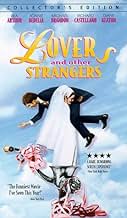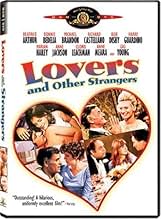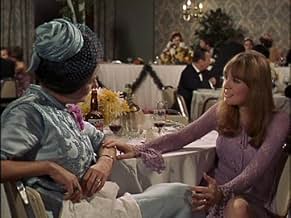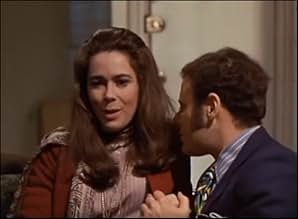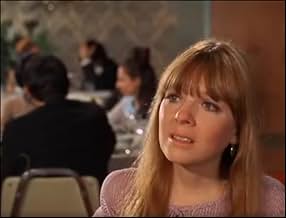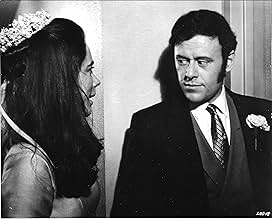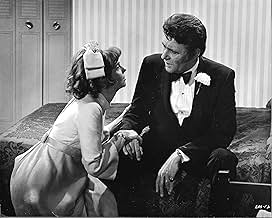O casamento de Mike e Susan é ofuscado pelo drama familiar, incluindo o divórcio do irmão de Mike, o caso do pai de Susan, os problemas conjugais de sua irmã e a perseguição do amigo de Mike... Ler tudoO casamento de Mike e Susan é ofuscado pelo drama familiar, incluindo o divórcio do irmão de Mike, o caso do pai de Susan, os problemas conjugais de sua irmã e a perseguição do amigo de Mike à dama de honra.O casamento de Mike e Susan é ofuscado pelo drama familiar, incluindo o divórcio do irmão de Mike, o caso do pai de Susan, os problemas conjugais de sua irmã e a perseguição do amigo de Mike à dama de honra.
- Direção
- Roteiristas
- Artistas
- Ganhou 1 Oscar
- 1 vitória e 8 indicações no total
- Bea
- (as Beatrice Arthur)
- Frank
- (as Richard Castellano)
- Father Gregory
- (as Morton Marshall)
Avaliações em destaque
As for the cast, Bonnie Bedelia and Michael Brandon are perfectly cast as Susan and Mike, who seem to be the only ones that are happy while everyone else isn't. Cloris Leachman (a few months before taking the role of Mary Richard's annoying and overbearing neighbor Phyllis) is also great as Susan's mother, who is oblivious to her husband's philandering. Also, in a very quiet performance, Dianne Keaton makes a solid debut as Mike's soon to be ex-sister-in-law, who show's up even though she know's she has to face her in-law's as well as her estranged husband. However, Bea Arthur (a couple of years before her career defining role as overbearing liberal Maude) steals the show as Mike's overbearing, devoutly Catholic mother. This film is definitely a sleeper.
Although some of the humor is a bit dated, most of the gags hold up very well. The interplay between all of the various Vecchio family members is timeless. The whole rap about "they're STILL together" is classic!
While Gig Young is spot on as the philandering father of the bride, the best repartee is by and between Bea Arthur and Richard S Castellano. Joseph Hindy is a stalwart foil for Castellano. Bob Dishy, Ann Meara and Harry Guardino have memorable character turns to flesh out a top-shelf ensemble.
The characterization of a working-class Italian-American family is perfect. When Mama Vecchio uses "Have some more soup, Frank" as the double -edged sword of nourishing her family while attempting to steer away from conflict, I could almost hear my Nonna (grandmother). She used soup to solve all the world's problems one bowl ata a time, too! My Mom still thinks that this is one of the funniest pictures she ever saw. I concur.
A young couple (Michael Brandon and Bonnie Bedelia) are about to get married but have not told their parents that they have been secretly living together. The supporting cast is great, many of them achieved bigger fame in TV. Anne Meara plays a frustrated wife whose husband (Harry Guardino) is not interested in sex anymore. The father of the bride (Gig Young) is a "with it" guy who does not believe in the Generation Gap. He is also cheating on his wife (Cloris Leachman) with a hysterical Anne Jackson. Bob Dishy is a lecherous usher who is desperately trying to bed a spacey bridesmaid (Marian Hailey). Best of all Beatrice Arthur and Richard Castellano (nominated for an Oscar for this) are the Italian Catholic parents of the groom. Their chemistry is hilarious and they also find out their other married son is looking to divorce his wife (played by Diane Keaton). Castellano is so old fashioned he threatens to give his 30 year old son a beating with his belt! There are two interesting bits by uncredited Conrad Bain and Jerry Stiller. Bain plays a priest who hears the confession of his future "Maude" co star Bea Arthur. Stiller (Anne Meara's real life husband) plays a wedding guest. The beautiful song "For All We Know" won the Oscar, it was later a big hit for the Carpenters.
The movie spares nobody. Hidebound Italian Catholics, bourgeois suburbanites, a macho ex-marine married to a feminist, an usher seducing a bridesmaid, counterculture cohabitation-- the superb cast delivers it all. Superficially, they all represent stereotypes, but-- and here's the trick-- they also defy simplistic categories they are unique individuals, and you cannot predict what any of them will say or do next. No Archie Bunkers or Meatheads here.
It's not Balzac, but it is a classic human comedy realized as popular art, two families afloat in the late '60s, when parents thought they were losing their offspring, because their kids were questioning traditions. But those kids were questioning ingrained habits, not traditional virtues, the deep values and ethics that form our larger society. "No gap here," is the refrain of Gig Young, a buffoonish patriarch determined to keep everybody happy-- but ultimately he's right. They all have more in common than they know, and by the time the young couple is married, we don't have to be told that their marriage will be every bit as complicated as their parents' are. The movie already told us.
If the movie has a core, it's Richard Castellano's speech to his elder son who is about to divorce his wife, an unthinkable first in the family. Castellano (in the same role he played in the original Broadway play) got an Oscar nomination, and he's wonderful throughout, but especially delivering the speech that becomes the spoken soul of the movie. It includes: "We're all strangers. But after a while you get used to it. You become deeper strangers. That's a sort of love."
Você sabia?
- CuriosidadesFilm debuts of Diane Keaton and Amy Stiller.
- Erros de gravaçãoWilma and Johnny put their son to bed in their hotel room and continue their fight. Evidently, they go back down to the reception, leaving the boy in the room, until we see Wilma bump butts with her mother-in-law on the dance floor, taunting Johnny until he flicks her off and she runs after him. However, in the background, both of their sons are chasing each other around and dancing. Did the dark-haired son awaken suddenly and they took him back downstairs?
- Citações
Richie Vecchio: Don't you understand, Joan and I are just not happy together.
Frank Vecchio: You hear that, Beatrice? They're not happy together.
Bea: I heard, Frank.
Frank Vecchio: So who's happy?
Bea: Who's happy?
Frank Vecchio: What, do you see me running around dancing in the streets?
Bea: Do you see your father running around dancing in the streets?
Frank Vecchio: What are you, better than me? You think your mother and I are happy?
Richie Vecchio: You mean you and mom aren't happy?
Frank Vecchio: [together with Bea] No!
Richie Vecchio: Then why did you stay together?
Frank Vecchio: [pause] We're content.
Bea: We're content.
Frank Vecchio: These kids today, all they're looking for is happiness.
Bea: Don't look for happiness, Richie. It will only make you miserable.
- ConexõesFeatures Quando Fala o Coração (1945)
- Trilhas sonorasFor All We Know
Music by Fred Karlin
Lyrics by Robb Royer (as Robb Wilson) and Jimmy Griffin (as Arthur James)
Performed by Larry Meredith
Courtesy of A&M Records
Principais escolhas
- How long is Lovers and Other Strangers?Fornecido pela Alexa
Detalhes
- Data de lançamento
- País de origem
- Idioma
- Também conhecido como
- Lovers and Other Strangers
- Locações de filme
- Empresa de produção
- Consulte mais créditos da empresa na IMDbPro
Bilheteria
- Faturamento bruto nos EUA e Canadá
- US$ 5.484.056
- Tempo de duração
- 1 h 44 min(104 min)
- Mixagem de som
- Proporção
- 1.85 : 1

